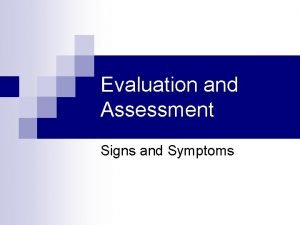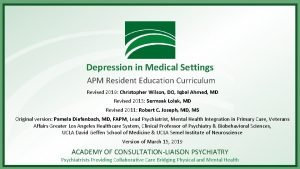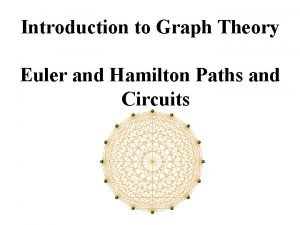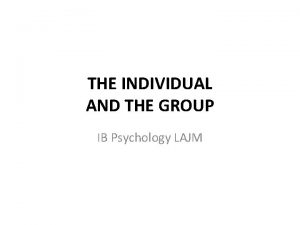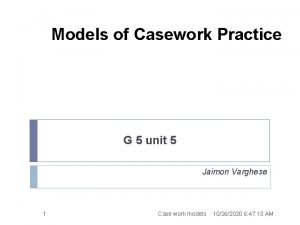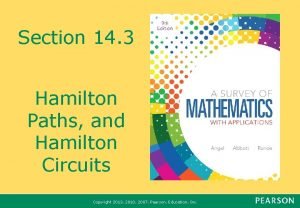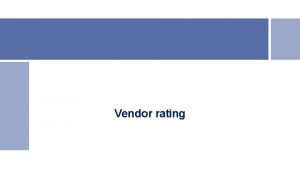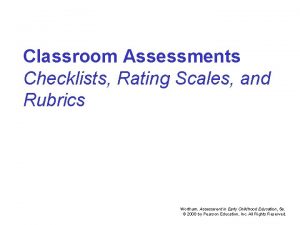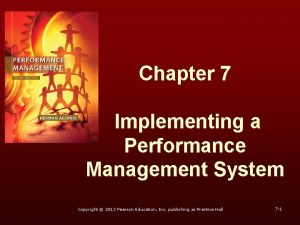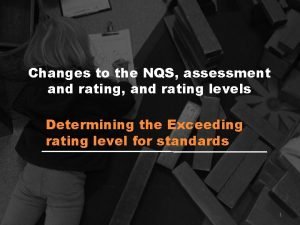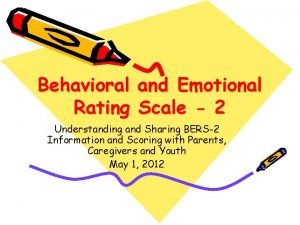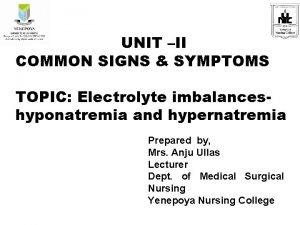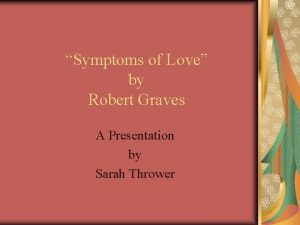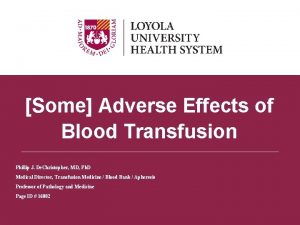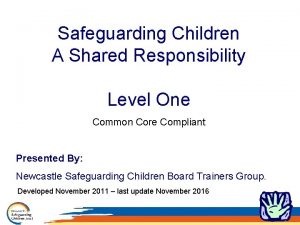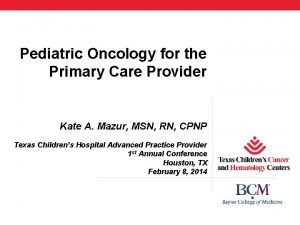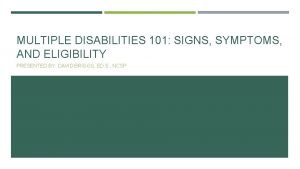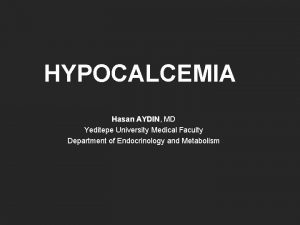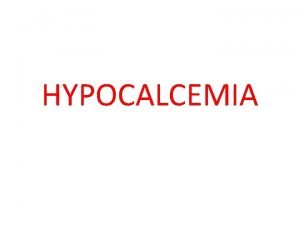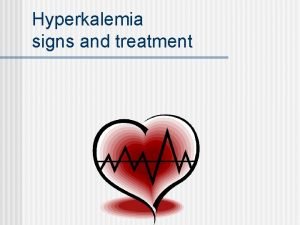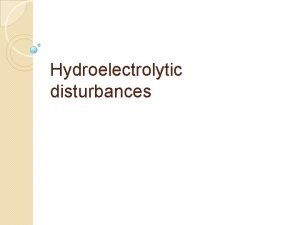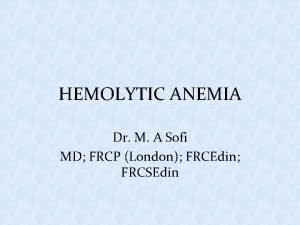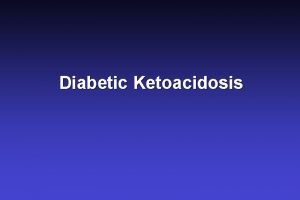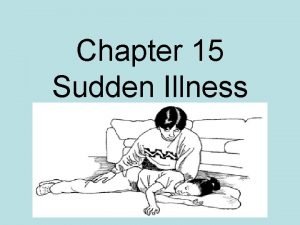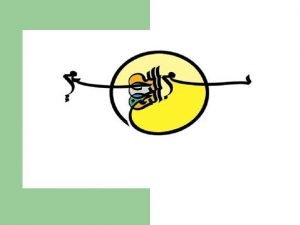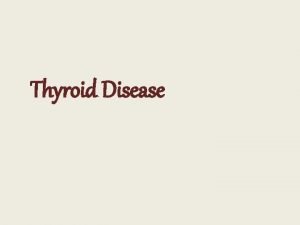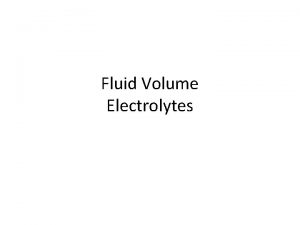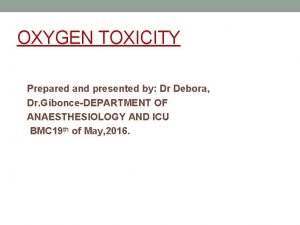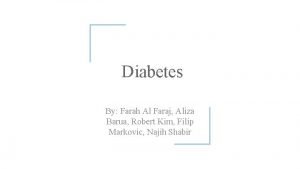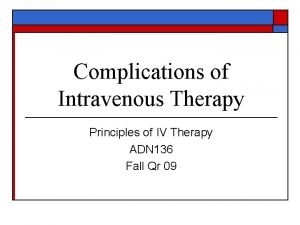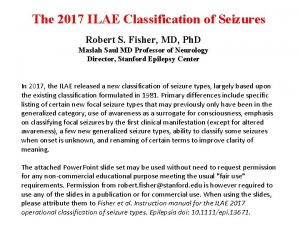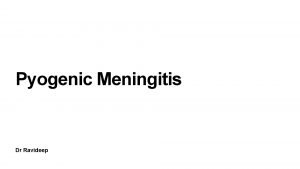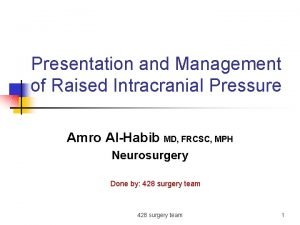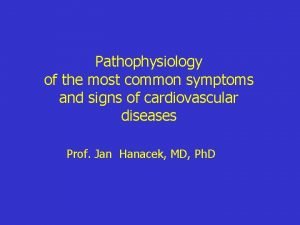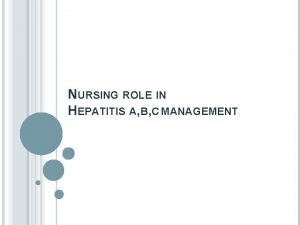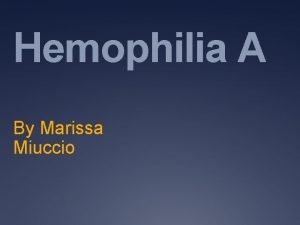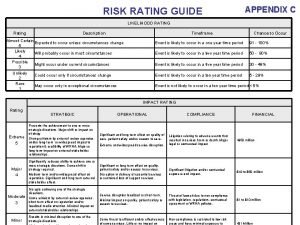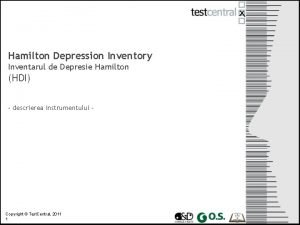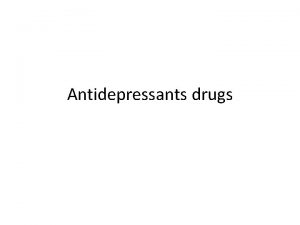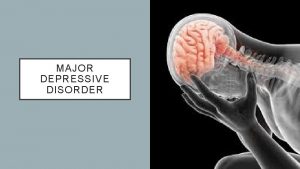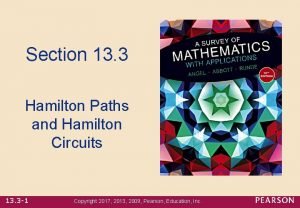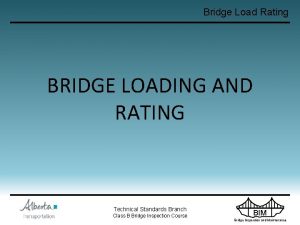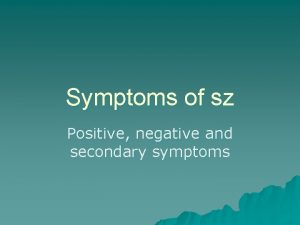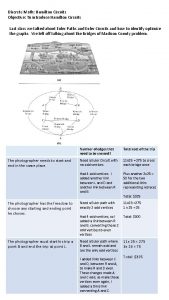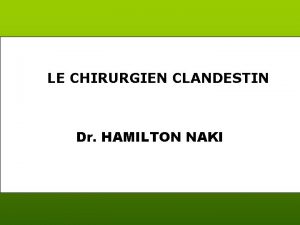Dysautonomic symptoms and major depression Hamilton Depression Rating













































- Slides: 45

Dysautonomic symptoms and major depression


Hamilton Depression Rating Scale • Depressed mood • Feelings of guilt • Suicide attempt • Insomnia- early • Insomnia- middle • Insomnia- late • Loss of interest • Retardation • Anxious behavior • Worrying • Hypochondriasis • Somatic anxiety • Appetite • Libido • Lethargy & fatigue • Body weight loss • Lack of insight

HAM-D • depressed mood • feelings of guilt • suicide • insomnia- early • Insomnia- middle • Insomnia- late • interest and activities • retardation • agitation • psychic anxiety • somatic anxiety • general somatism • genital symptoms • hypochondriasis • body weight loss • insight Component disturbance of a depressed mood Depressed mood Sleep disturbance Psychic anxiety Somatic anxiety Hong CJ, Oct 2006

Hamilton Anxiety Rating Scale 1. Anxious mood • worries • anticipates worst 2. Tension • startles • cries easily • restless • trembling 3. Fears • fear of the dark • fear of strangers • fear of being alone • fear of animal 4. Insomnia • difficulty falling asleep • nightmares 5. Intellectual • poor concentration • memory impairment 6. Depressed Mood • decreased interest in activities • anhedonia 7. Muscular complaints • muscle aches or pains • bruxism 8. Sensory complaints • tinnitus • blurred vision

Hamilton Anxiety Rating Scale 9. Cardiovascular Symptoms • tachycardia • palpitations • chest pain • sensory of feeling faint 10. Respiratory Symptoms • chest pressure • choking sensation • shortness of breath 11. Gastrointestinal Symptoms • dysphagia • nausea or vomiting • constipation • weight loss 12. Genitourinary Symptoms • urinary frequency or urgency • dysmenorrhea • impotence 13. Autonomic Symptoms • dry mouth • flushing • pallor • sweating 14. Behavior at Interview • fidgets • tremor • paces

Milestones of Psychiatry Schizophrenia Depression chlorpromazine imipramine clozapine fluoxetine 1950‘s 1980‘s Hong CJ, Dec 1999


Association of Anxiety-Related Traits with a Polymorphism in the Serotonin Transporter Gene Regulatory Region Lesch KP: Science. 1996 a self-report inventory based on the five-factor model of personality

Molecular Psychiatry 2002 July

Changes in Autonomic Reactivity? Human • Depression/Anxiety • Antidepressant treatments • Anticholinergics in depression and dementia • PS 1 mutation dementia • Postpartum depression Animal • Helplessness/Anxiety • Antidepressant treatments • Anticholinergics in depression and dementia • PS 1 mutation mice • Infanticidal mother mice

Inescapable/uncontrollable shock (Seligman & Maier, 1971; Anisman 1979)

Helplessness Training & Escape Test Video Psy. Lab 2002/04/04

Fig. 2. Five of the 8 C 57 male mice remained helpless 10 days after the stress protocol of intermittent conditioning inescapable minor foot-shock. Non-helpless Helpless

Figure 6. GRPR-Deficient Mice Have Enhanced and Resistant Long. Term But Not Short-Term Amygdala-Dependent Fear Memory


Changes in Autonomic Reactivity? Human • Depression/Anxiety • Antidepressant treatments • Anticholinergics in depression and dementia • PS 1 mutation dementia • Postpartum depression Animal • Helplessness/Anxiety • Antidepressant treatments • Anticholinergics in depression and dementia • PS 1 mutation mice • Infanticidal mother mice

Potential antidepressant effect of PX 01 was demonstrated in FST and TST

* * * Figure 3. The ambulatory distance in 5 min locomotion test (n=5 for each group). Mice receiving cysteamine administration have significant reductions in the locomotion activities(p<0. 05). 20 min 5 min rest Injection 6 min rest locomotion TST 14 min 6 min rest FST 2007/01/19

Figure 4. The mobility time in 6 min tail suspension test. There are no differences between groups receiving vehicle and drugs (control, n=5; cysteamine 50 mg/kg, n=5, p=0. 149; cysteamine 100 mg/kg, n=4, p=0. 816; cysteamine 200 mg/kg, n=5, p=0. 179; imipramine 10 mg/kg, n=4, p=0. 258). 20 min 5 min rest Injection 6 min rest locomotion TST 14 min 6 min rest FST 2007/01/19

Figure 5. The mobility time in 6 min Forced swimming test. There are no differences between groups receiving vehicle and drugs (control, n=5; cysteamine 50 mg/kg, n=5, p=1. 000; cysteamine 100 mg/kg, n=5, p=0. 497; cysteamine 200 mg/kg, n=5, p=0. 052; imipramine 10 mg/kg, n=5, p=0. 983). 20 min 5 min rest 6 min rest 14 min 6 min rest 2007/01/19 Injection locomotion TST FST

Changes in Autonomic Reactivity? Human • Depression/Anxiety • Antidepressant treatments • Anticholinergics in depression and dementia • PS 1 mutation dementia • Postpartum depression Animal • Helplessness/Anxiety • Antidepressant treatments • Anticholinergics in depression and dementia • PS 1 mutation mice • Infanticidal mother mice

Dementia and Autonomic Reactivity • Acetylcholine deficiency is an important pathophysiology of dementia • Acetylcholine is the key neurotransmitter of parasympathetic nervous system • Anticholinergic agents are bad for memory but good for mood

Archive of General Psychiatry Oct 2006


Changes in Autonomic Reactivity? Human • Depression/Anxiety • Antidepressant treatments • Anticholinergics in depression and dementia • PS 1 mutation dementia • Postpartum depression Animal • Helplessness/Anxiety • Antidepressant treatments • Anticholinergics in depression and dementia • PS 1 mutation mice • Infanticidal mother mice

ENU-mutagenized mice displaying waddling behavior were linked to Chr. 18 151 M B 6, ♂ waddling (video) Normal BALB, ♀ BALB F 1 (video) Dominant Inheritance F 2 (video) Rough mapping Psy. Lab 2006 Dec

Four of five (80%) waddling mother mice did not nurse their pups The only one nursing mother killed all of her five pups at age 2 weeks.

Functional and Micro-Magnetic Resonance Imaging Center DWI_SE_BIO waddling control Lt Entorhinal cortex Lat ventricle TR=1500 ms TE=32 ms Slth=1 mm FOV=2 cm NEX=4 SW=41666. 6 Hz Big delta=15 ms Matrix =256*192 b=1100 s/mm 2

Functional and Micro-Magnetic Resonance Imaging Center DWI_SE_BIO waddling control Lat ventricle TR=1500 ms TE=32 ms Slth=1 mm FOV=2 cm NEX=4 SW=41666. 6 Hz Big delta=15 ms Matrix =256*192 b=1100 s/mm 2




OVER


• The prevalence of autonomic symptoms in dementia and their association with physical activity, activities of daily living and quality of life. Dement Geriatr Cogn Disord. 2006; 22(3): 230 -7. Epub 2006 Aug 10. • Acute dysautonomia following mumps. Neurol India. 1999 Jun; 47(2): 130 -2. Review. • Depression, the autonomic nervous system, and coronary heart disease. Psychosom Med. 2005 May-Jun; 67 Suppl 1: S 29 -33. Review. • Depression in patients with acute myocardial infarction: influence on autonomic nervous system and prognostic role. Results of a five-year follow-up study. Int J Cardiol. 2007 Jan 31; 115(1): 46 -51. Epub 2006 Jun 22. • Increased systemic catecholamines in complex regional pain syndrome and relationship to psychological factors: a pilot study. Anesth Analg. 2004 Nov; 99(5): 1478 -85; table of contents. • A functional-structural model to understand cardiac autonomic nervous system (ANS) dysregulation in affective illness and to elucidate the ANS effects of antidepressive treatment. Eur J Med Res. 2004 Jan 26; 9(1): 37 -50. Review.

Dysautonomia in dogs Dysuria 11/11 Distended urinary bladder 10/10 Mydriasis 11/11 Absent pupillary light reflex 11/11 Dry mucous membranes 10/11 Weight loss 8/10 Decreased Schirmer tear test (<15 mm/min) 8/10 Decreased anal reflex 7/9 Decreased appetite 7/10 Vomiting/Regurgitation 6/9 Lethargy 7/11 Elevated third eyelid 5/11 Constipation 3/9 Dysphagia 3/9 Diarrhea 3/9 Weakness 2/9 Abdominal pain 1/10

Diagnostic Criteria for Major Depressive Episode • • Diagnostic Criteria for Major Depression Depressed mood Markedly diminished interest or pleasure More than 5% body weight loss or gain in a month Insomnia or hypersomnia Psychomotor agitation or retardation Fatigue or loss of energy, feeling of worthlessness or guilt Diminished ability to think, concentrate Recurrent thoughts of death # Five of above symptoms appear most of the day, nearly every day for at least 2 weeks and cause a significant change from previous functioning.

Montgomery-Asberg Depression Rating Scale (1) apparent sadness (2) reported sadness (3) inner tension (4) reduced sleep (5) reduced appetite (6) concentration difficulties (7) lassitude (8) inability to feel (9) pessimistic thoughts (10) suicidal thoughts

SOMATIC ANXIETY (Tachycardia, palpitations, chest pain, choking feeling, sighing, dyspnea, hyperventilation, dry mouth, difficulty swallowing, flatulence, gastric pain, nausea, vomiting, diarrhoea, constipation, urinary frequency, sweating, giddiness, blurred vision or tinnitus) The ANS controls • Cardiovascular system • Digestive system • Respiratory functions • Salivation • Perspiration • Pupils • Micturition • Erection

Am J Hum Genet. 2001 March; 68(3): 753– 758. Familial Dysautonomia Is Caused by Mutations of the IKAP Gene Sylvia L. Anderson, 1 Rocco Coli, 1 Ira W. Daly, 1 Elizabeth A. Kichula, 1 Matthew J. Rork, 1 Sabrina A. Volpi, 1 Josef Ekstein, 2 and Berish Y. Rubin 1 1 Department of Biological Sciences, Fordham University, Bronx, NY; and 2 Dor Yeshorim, The Committee for Prevention of Jewish Diseases, Brooklyn, NY/Jerusalem

Symptoms in an older child with familial dysautonomia • Orthostatic hypotension - extreme drop in blood pressure with change in posture • Breath holding in early years to the point of fainting • Episodic vomiting • Excessive drooling and sweating • A smooth tongue and decrease in sense of taste • Inappropriate temperature control with very high to very low temperatures • Poor weight gain and growth • Decreased reaction to pain or no reaction at all • Cold, puffy hands and feet • Extremes in blood pressure • Corneal abrasions and dry eyes • Gastric dysmotility • Dysautonomic "crisis"

Autonomic nervous system controls • Cardiovascular system • Digestive system • Respiratory functions • Salivation • Perspiration • Pupils • Micturition • Erection

Antidepressants in Depression and Anxiety • The serotonergic system has been implicated in the alterations in appetite, energy, sleep, mood, libido, and cognitive functioning seen in anxiety and affective disorders.

Mitral valve prolapse and dysautonomia • • Fatigue Chest pain Palpitations or irregular heart beat Migraine headaches Anxiety Depression Panic attacks Shortness of breath
 Hamilton anxiety rating scale
Hamilton anxiety rating scale Riset rating dan non rating
Riset rating dan non rating Breast tenderness before period vs early pregnancy sign
Breast tenderness before period vs early pregnancy sign Symptoms of depression
Symptoms of depression Euler and hamilton circuits
Euler and hamilton circuits The individual and the group ib psychology
The individual and the group ib psychology Social case work models
Social case work models American idol
American idol Hamilton lugar school of global and international studies
Hamilton lugar school of global and international studies Compare and contrast hoover and roosevelt great depression
Compare and contrast hoover and roosevelt great depression Supplier rating system
Supplier rating system Mediation rating billing
Mediation rating billing Checklists and rating scales are used as
Checklists and rating scales are used as Pilot testing in performance management
Pilot testing in performance management Nqs assessment and rating
Nqs assessment and rating Emotional rating scale
Emotional rating scale Nursing diagnosis for vomiting
Nursing diagnosis for vomiting Sexual abuse signs and symptoms
Sexual abuse signs and symptoms Symptoms of love robert graves analysis
Symptoms of love robert graves analysis Taco vs trali
Taco vs trali Signs of shock
Signs of shock Daniel pelka sister
Daniel pelka sister Kate
Kate Signs and symptoms of multiple disabilities
Signs and symptoms of multiple disabilities Severe hypocalcemia
Severe hypocalcemia Hypocalcemia signs and symptoms
Hypocalcemia signs and symptoms Signs and symptoms of hyperkalemia
Signs and symptoms of hyperkalemia Low potassium symptoms
Low potassium symptoms Hemolysis symptoms
Hemolysis symptoms Dka differential diagnosis
Dka differential diagnosis Signals of sudden illness
Signals of sudden illness Portal hypertension symptoms
Portal hypertension symptoms Hyperkalemia
Hyperkalemia Signs and symptoms of trali
Signs and symptoms of trali Management of hyperthyroidism
Management of hyperthyroidism Ecf volume deficit
Ecf volume deficit Rsv nursing diagnosis
Rsv nursing diagnosis Oxygen poisoning
Oxygen poisoning Signs and symptoms of hyperglycemia
Signs and symptoms of hyperglycemia Iv site pain and swelling
Iv site pain and swelling Epilepsy ilae 2017
Epilepsy ilae 2017 What is meningitis
What is meningitis Icp
Icp Pathophysiology signs and symptoms
Pathophysiology signs and symptoms Hepatitis
Hepatitis Haemophilia a
Haemophilia a


